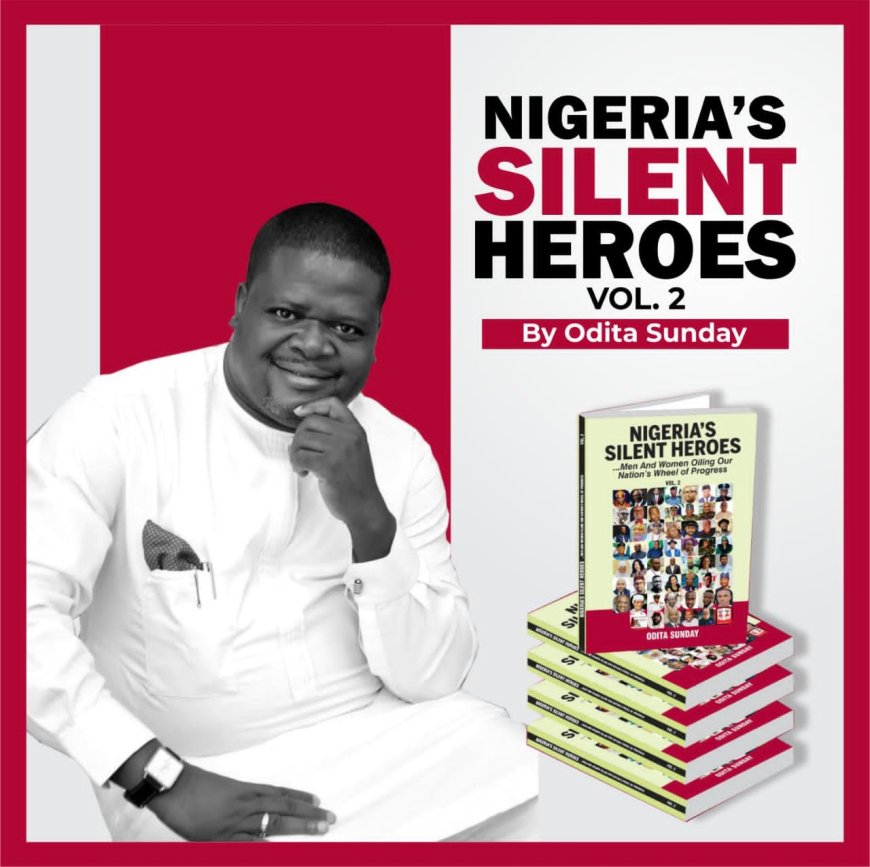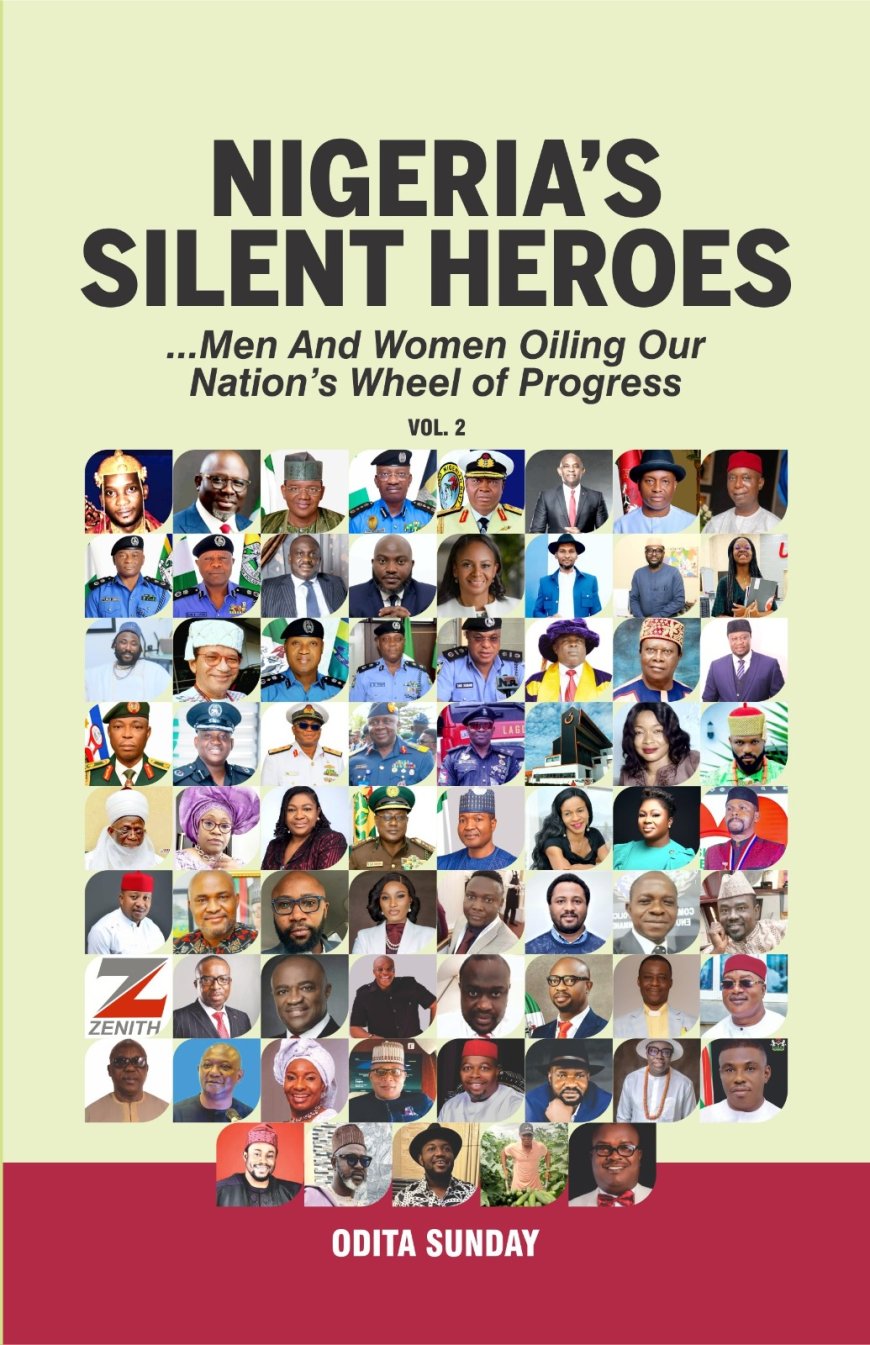A book of profiles of heroes: Odita Sunday Review Musa Jibril As Publication of the Year.
A book of profiles of heroes: Odita Sunday Review Musa Jibril As Publication of the Year.


Book title: Nigeria’s Silent Heroes: Men and Women Oiling Our Nations Wheels of Progress 2.
According to an adage, journalism is history in a hurry. And, in the words of Phillip L. Graham, Washington Post’s famous president and publisher, reporting is the "first rough draft of history." In that case, there is always a need for afterthought, analysis and refinement, and this usually comes when journalists further open up the vista of writing and elevate the reporter’s 'craft' to the fine art of book writing.
Sadly, only a handful of journalists have the time, tenacity, temperament and even the creativity for such an undertaking.
Odita Sunday belongs to this exclusive journalist-author club. He published the first volume of a compendium of 52 achievers in 2023. Now, barely a year after, the second volume of the encyclopaedia, titled Nigeria’s Silent Heroes: Men and Women Oiling Our Nations Wheels of Progress 2, is ready—a 436-tome of diligent profiling of 69 incredible Nigerians.
Of the personalities in the compendium of human and corporate entities, some are famous, others are unsung, but all are deserving of recognition for their good work and impact on society, in public service or private enterprise.
The heroes are painstakingly profiled, their chronicles replete with essential details: humble beginnings, trajectories, motivations, travails, triumphs, rare qualities, X-factors, achievements and impact.
Odita’s heroes are an eclectic lot drawn from diverse segments of society: business and banking; politics and administrations; security and law enforcement; traditional and religious institutions; media, music and ministry; oil and gas; construction, vocation and education—every aspect of the organic whole of society. Within a wide-ranging spectrum, he meticulously captured the dimension, depth and diversity of contemporary Nigerian society, concisely simplifying the heroes into their background, noblesse obliges, and impact. Collectively, their narrative is a celebration of time-honoured virtues such as patriotism, selflessness, vision, sacrifice, ingenuity, perseverance, and, above all, service to humanity. Overall, the collage portrays the fine nature of humanity and the inner goodness of the quintessential Nigerian, untainted by avarice or bigotry of religion and ethnicity.
The author’s diligence is reflected in his use of never-seen-before photos from archives and fresh details that make the individual three-dimensional.
By all means, Nigeria’s Silent Heroes 2 is an all-inclusive Who’s Who in the business of service to society, more comprehensive than Wikipedia or other online repositories of dossiers.
Of course, some of the personalities are well-known public figures who’ve been hugging the limelight for ages, including the likes of Tony Elumelu, Ifeanyi Ubah and Bello Matawalle. Others came into the limelight in recent dispensation, like Delta State Governor Sherriff Oborevwori and Inspector General of Police Kayode Egbetokun (but with long records of service). Some are hidden gems that the author unveils to the readers. Nonetheless, the common denominator is that their impact on society is seismic.
Indeed, the author exercised prudence in his selection, backing up each profile with solid facts that cannot be argued against.
Here’s the point: If you think, for example, that you know Elumelu so well or, er, Prince Ned Nwoko, or Dame Pauline Tallen, then read Odita’s book, and you will be amazed to see these heroes in a new light; then you cannot help but appreciate the author for putting 18 years of his journalistic skills and experience to work in the writing of the book.
Readers of The Guardian can easily feel the Odita vibe in Nigeria’s Silent Heroes. He writes according to a pattern: the presentation of facts in a simple, concise reportorial style that is fact-backed and steeped in accuracy. In writing his new book, Odita was in his element; his writing style is a mix of scholarly touch and the creativity of fine features. Read, enjoy and be enlightened.
The great challenge in writing a book of this magnitude is the difficulty of accessibility to the diverse dramatis personae and the constraints of distance and time. Somehow, the author matched the task with the required energy, passion, tenacity of purpose, patience and discipline. Otherwise, how could he have pulled off writing about 69 entities?
The sheer number of the heroes profiled and the depth of biographical details give the reader the sense that the author is well-armed with a journalist's greatest asset: sources.
As a journalist, Odita’s beat is crime, security and defence, to which at least 15 years of his career were dedicated, rising to become Guardian’s head of the desk. That raises the question: "Why didn't he write crime or national security book?"
Well, he’s also a philanthropist with a couple of initiatives that give back to society. Hence his favourable disposition for altruism and the raison d'être for the Silent Hero initiative to appreciate those who sacrificed for the good of society.
Revealing his motivation for writing this compendium, he says: "I discovered that a lot of people who are doing things in Nigeria with integrity and uprightness are out of the spotlight, and I felt duty-bound to bring them to public awareness by first honouring them with awards and then documenting their achievements. In a way, the compendium is complementary to my Silent Heroes Award Initiative. We honour deserving recipients with an award, and we also document their biography for posterity, so the coming generation can read about their accomplishment."
How may we commend Odita for this great service beyond the usual lip service that he should 'keep it up' and the trite sentiment that posterity will remember him kindly?
The answer is this: We all should buy copies of his encyclopaedias for our libraries. The two volumes of Nigeria’s Silent Heroes are a collection for the future. Beyond this, there are personal benefits to be unlocked in reading the books.
"When you read about great people doing great works, you are inspired to be great; their travails and triumphs give you hope; their principles and dedication to the common good guide your steps in your ascension to greater heights," says the author.






















